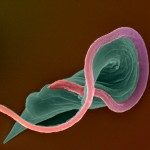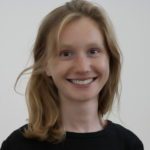Link to Pubmed [PMID] – 34767618
Link to DOI – 10.1371/journal.ppat.1010038
PLoS Pathog 2021 Nov; 17(11): e1010038
Antigenic variation is an immune evasion strategy used by Trypanosoma brucei that results in the periodic exchange of the surface protein coat. This process is facilitated by the movement of variant surface glycoprotein genes in or out of a specialized locus known as bloodstream form expression site by homologous recombination, facilitated by blocks of repetitive sequence known as the 70-bp repeats, that provide homology for gene conversion events. DNA double strand breaks are potent drivers of antigenic variation, however where these breaks must fall to elicit a switch is not well understood. To understand how the position of a break influences antigenic variation we established a series of cell lines to study the effect of an I-SceI meganuclease break in the active expression site. We found that a DNA break within repetitive regions is not productive for VSG switching, and show that the break position leads to a distinct gene expression profile and DNA repair response which dictates how antigenic variation proceeds in African trypanosomes.



